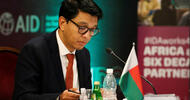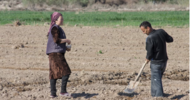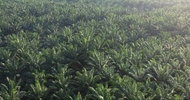Both public and private sector investors in the Gulf are also looking at ways to improve local food supplies, by investing in a range of outlets from arable farm land in the Sudan, Algeria and Pakistan to introduce new technology to enhance the local production of foodstuffs and grains, livestock, poultry and fish.
- The Middle East
-
01 July 2008
Is land-grabbing over, in Mozambique and across Africa and the rest of the developing world? Now that crop and food prices have returned to their usual punishingly low levels, is the pressure off from foreign buyers looking to acquire large tracts of agricultural lands?
- Truthout
-
15 November 2016
Mozambique’s rural communities remain on high alert, even as they successfully repel many of the largest land grabs.
- FoodTank
-
01 November 2016
New report provides a detailed examination of the role of the Indian government and Indian companies engaged in overseas agricultural land acquisitions in Africa, Asia and Latin America.
Iowa agribusiness investor Bruce Rastetter is leading a project to turn as much as 800,000 acres [324,000 hectares] of land in the east African country of Tanzania into a massive grain-and-livestock operation.
- Des Moines Register
-
14 June 2011
Daewoo Logistics of South Korea has secured farmland in Madagascar to grow food crops for Seoul, in a deal that diplomats and consultants said was the largest of its kind.
- Financial Times
-
18 November 2008
IP-rich New Zealand is a logical partner for resource-rich Gulf states as a producer of food in places like Africa, says New Zealand's Minister of Foreign Affairs.
- NZ Government
-
01 Mar 2012
One of the manifestations of the greed of Africa's domestic plutocrats and their imperial overlords is the massive land grab that we are witnessing today.
- Pambazuka
-
02 November 2011
A focus on agricultural productivity should not become a cover for foreign private companies to grab land or impose expensive, input-intensive methods in the name of modernisation.
Growing food in foreign lands has a long history. But the 21st century version of outsourced agriculture presages something fundamentally new.
- Seed Magazine
-
27 April 2009
Research shows that the plantation model of development has failed to deliver promised benefits to Liberia’s rural people and that they benefit far more from retaining their traditional lands.
"A key obstacle to more transparent debate and informed decisions by governments and investors [involved in global land transactions] is the lack of science-based information," writes Surendra Shah in Nature magazine
These issues will be central to the World Summit on Food Security to be held from November 16 through 18 at the headquarters of the UN Food and Agriculture Organization in Rome.
Obama announces G8's New Alliance for Food Security and Nutrition and reiterates support for the "process and pilot use of the Principles of Responsible Agricultural Investment"
- US government
-
18 May 2012
Responding to concerns raised by Friends of the Earth International and others about the impacts of land grabbing, The World Bank claims that land lease deals in developing countries can reduce hunger and poverty, and build sustainable agriculture. The facts tell otherwise.
"All of a sudden the world is waking up and saying, 'Wow, emerging markets, food security... this asset class is going to really perform in the medium term -- the next 8-20 years,'" says new convert James Howard, manager of the Futuregrowth Agri-Fund
Ernest Corea, a former senior consultant with the Washington-based Consultative Group on International Agricultural Research (CGIAR), told IPS the surrender of nationally-owned farm land and land rights to foreign interests - whether individuals, the corporate sector or governments - amounts to an erosion of sovereignty.
Authorities have attributed the growth of a saline lake to irrigation runoff, including that from a company bought this year from the government by Horizon Plantations, a venture majority owned by Mohamed al- Amoudi, the largest single investor in Ethiopia.
Investment by Indian-owned Karuturi Global has raised questions about whether Ethiopia is literally giving away the farm, or conversely, launching a 'green revolution' to help Ethiopia feed itself.
- CS Monitor
-
23 December 2011
Obtaining millions of hectares for farming in Africa, Indian firms are playing predator.
- Outlook India
-
11 October 2011
Since the financial and food crises of 2008, the World Bank Group has incentivized and facilitated land grabs in several countries in Africa, Latin America and parts of Asia.
- World Press
-
16 November 2011
Sai Ramakrishna Karuturi tells Reuters that the governments of India and Ethiopia are working to “amicably resolve outstanding Karuturi issues”.
Are the government's large-scale developments in southern Ethiopia forcing local populations to move with the times or just move out the way?
- Think Africa Press
-
21 August 2013
The Hindu's Addis Ababa correspondent Aman Sethi has recently written about Indian companies’ involvement in Ethiopia and Mali, and on 19 May he took part in a Q&A session on Facebook on the issue of so-called Indian land grabs in African countries.
- Global Voices
-
22 May 2013
As land and water become scarce, as the earth’s temperature rises, and as world food security deteriorates, a dangerous geopolitics of food scarcity is emerging, writes Lester Brown
- The Futurist
-
03 January 2013
US government mission in Riyadh writes, "Although the idea of Saudi farms in
Africa may sound farfetched, the Kingdom has for years hired foreign managers and laborers to administer its farms and other agribusinesses (e.g., most Saudi wheat farms currently have Egyptian managers)."
- Wikileaks
-
24 January 2010
An Ethiopian farmer could sue the UK government after claiming a project that received funding from Britain led to the eviction from his farm and human rights abuses.
"Africa will be more food insecure if these investments go to other parts of the world and Africa has to turn to those places to buy food," according to Dr Ousmane Badiane of IFPRI
- This is Africa
-
02 July 2012
For millions of indigenous villagers and pastoralists land grabbing means forced relocation, loss of livelihoods, and a death blow to their ancient cultures.
- Huffington Post
-
03 April 2012
A Saudi Arabian company has leased tens of thousands of acres in western Ethiopia to grow rice for export. The Ethiopian government says it will help provide food security for its citizens, but some who live in the region, say they’re not seeing any benefits.















